Semrush vs SpyFu: Which Competitor Analysis Tool is Better? (2022) - 99signals
 If you're having trouble deciding between Semrush and SpyFu, you've come to the right place.
If you're having trouble deciding between Semrush and SpyFu, you've come to the right place.
In this article, I'll put Semrush and SpyFu to the test and help you decide which SEO tool is better suited for competitor analysis.
If you've landed here, you're probably already aware that Semrush and SpyFu are amongst the most popular competitor research tools on the market, alongside Ahrefs, GrowthBar, and Mangools.
While Semrush is an all-in-one marketing toolkit with competitive intelligence capabilities, SpyFu focuses purely on competitor analysis.
So to maintain a level playing field for this comparison, I'll be evaluating Semrush and SpyFu solely on features linked with competitor research.
I'll be taking the following four parameters into account:
- Competitor analysis
- Keyword research
- Ease of use and accessibility
- Pricing plans
Now without further delay, let's compare Semrush and SpyFu, and find out which SEO tool is the best in terms of competitive analysis.
Note: To get the most out of this comparison guide, I'd encourage you to create an account on Semrush and SpyFu. You can find the relevant links below. You can sign up for a 30-day free trial of Semrush Pro (worth $119.95) and sign up for SpyFu's free plan. At this point in time, SpyFu is not offering a trial on any of their paid plans. But their free plan is pretty good, albeit with a few limitations.
Table of Contents
Introduction to Semrush and SpyFu

Semrush's predecessor, SEOquake company, was first launched by Oleg Shchegolev and Dmitry Melnikov as an SEO browser extension in 2007 before being rebranded as Semrush in 2008. It has since gone on to become one of the leading cloud-based SEO services on the market with over 5 million users across the world.
The Semrush platform features a comprehensive set of tools for site audit, keyword research, position tracking, SEO and PPC competitor analysis, on-page SEO checker, backlink analytics, and much more.
Semrush currently manages close to 20 billion keywords and 818 million domains in 142 geo databases.
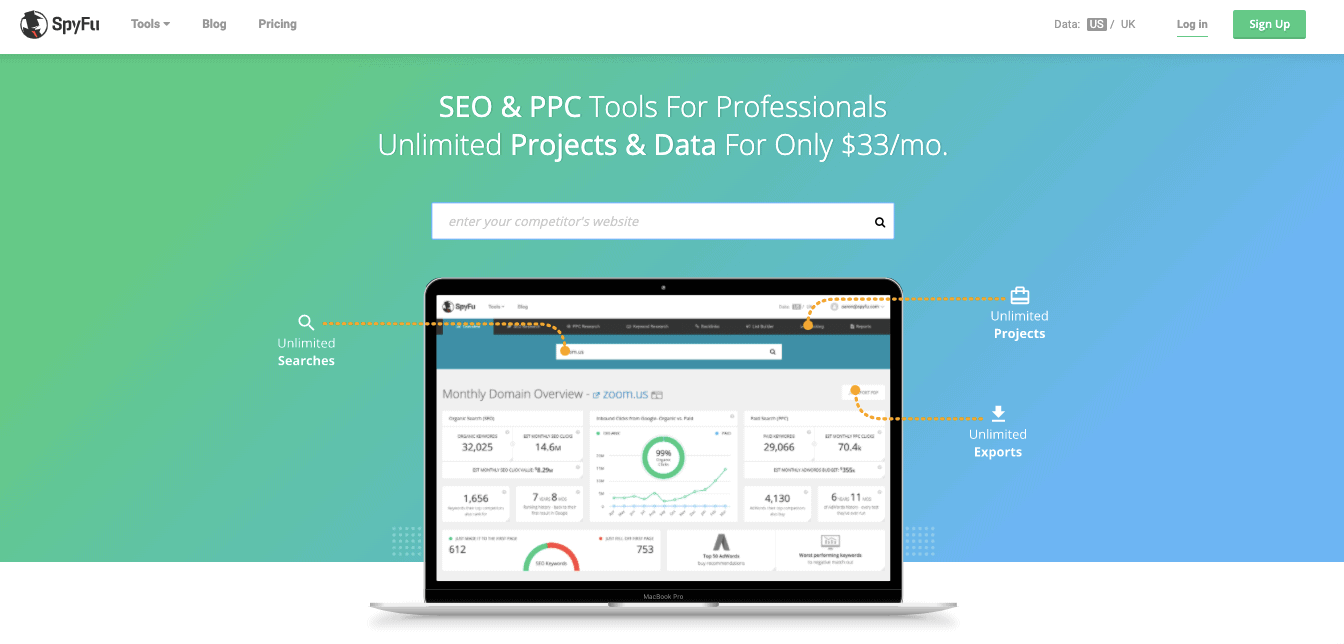
SpyFu was founded by Mike Roberts in 2006 to help businesses craft their SEO and PPC strategies. Mike's business philosophy is to turn your rivals into your best advisors and that philosophy is at the core of SpyFu.
As the name suggests, SpyFu lets you spy on your competitors' online strategies and analytics. You can use it to gather insights on your organic as well as paid competitors.
SpyFu's data is collected from Google search results in the US and UK. The tool won't show you full results outside of these countries, which just might be SpyFu's biggest drawback.
With that introduction of the two tools out of the way, it's now time to put these tools to the test.
Let's start by reviewing their competitor analysis features.
Competitor Analysis: Semrush vs SpyFu
If you want to develop a fool-proof marketing strategy for your business, you need to run a competitor analysis. By analyzing your competitors' marketing efforts, you can evaluate their strengths and weaknesses, as well as identify gaps and opportunities for your brand in the market.
Both Semrush and SpyFu are capable of providing a comprehensive report of your competitors' SEO and PPC strategies. But which SEO platform is more feature-rich and gives the most accurate data? Let's find out!
Semrush: Competitor Analysis Tools

With Semrush's Competitive Research Toolkit, you can identify your organic and paid competitors, and reverse-engineer their most successful SEO and PPC practices.
The Competitive Research Toolkit is divided into five different categories:
Traffic Analytics and Market Explorer are part of Semrush's Competitive Intelligence (CI) add-on package which costs an additional $200/month. To learn more about Traffic Analytics and its key features, check out The Ultimate Guide to Semrush Traffic Analytics.
To keep things simple, we'll just be examining the main tools in the first four categories in the Semrush Competitive Research Toolkit.
To get started with competitor analysis on Semrush, select "Competitive Research Toolkit" from the drop-down at the top left menu in the interface.
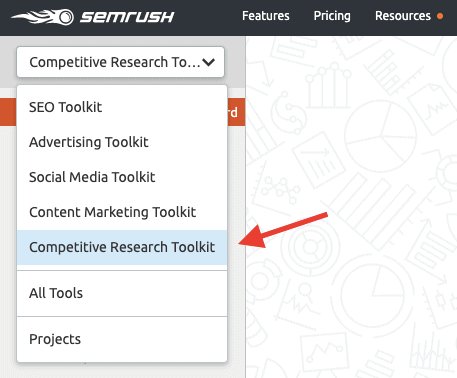
From the competitive research dashboard, navigate to:
SEO > Organic Research > Enter your competitor's domain
Alternatively, if you'd like Semrush to identify your organic competitors for you, you can type your own domain in the search box.
The Organic Research overview report provides a top-level view of your website's organic keywords, organic traffic, top pages, and main organic competitors.

Visit the "Competitors" tab to see a list of all the sites that are competing with your site in search results for the same keywords.

Click on any of the organic competitors to get a detailed report on that domain's top organic keywords, top-ranking pages, position changes, and so on.
To view your competitor's top organic keywords, visit the "Top Organic Keywords" section in the report and click on the "View all organic keywords" button.
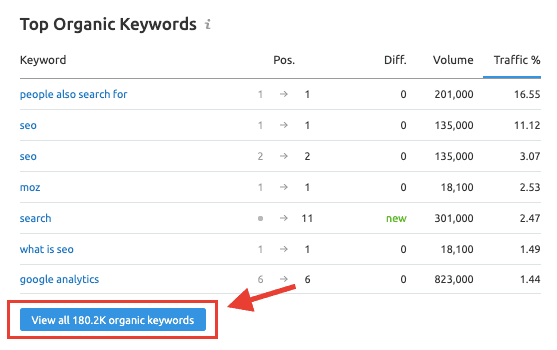
The list of keywords will probably be too long, so feel free to play with the filters until you get the most relevant data.
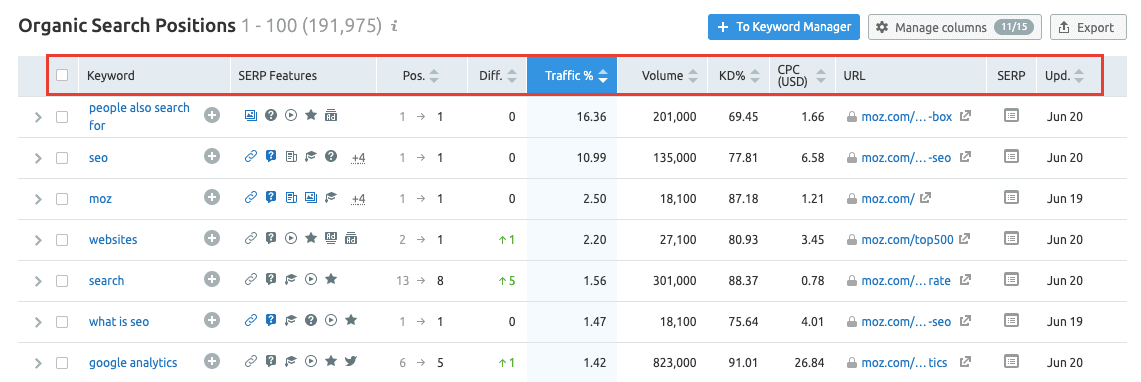
Click on any of the keywords in the report to get data on important keyword metrics like search volume, keyword difficulty, competition level, and more.
You can use this data to fine-tune your content strategy.
Next, click on "Backlink Analytics" to get an overview report of your competitor's backlinks.
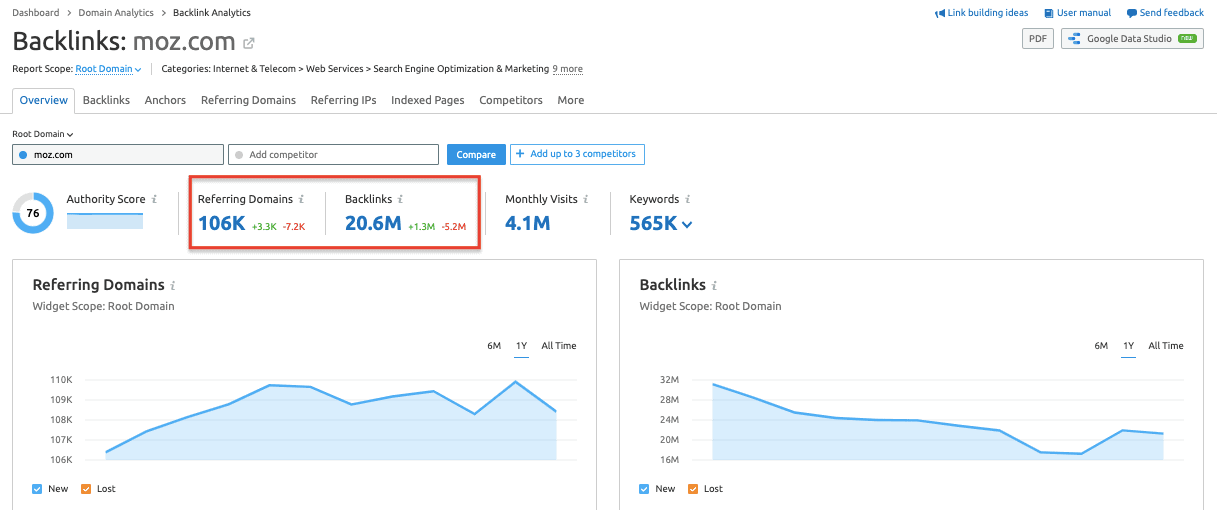
Visit the "Referring Domains" tab to get a complete picture of your competitor's backlink profile. Leverage this data in your link building outreach efforts.
Similarly, you can unravel your paid competitors' data by navigating to:
Competitive Research > Advertising Research > Enter your competitor's domain
The Advertising Research overview report provides details on the domain's paid keywords, average monthly paid traffic, and traffic cost.
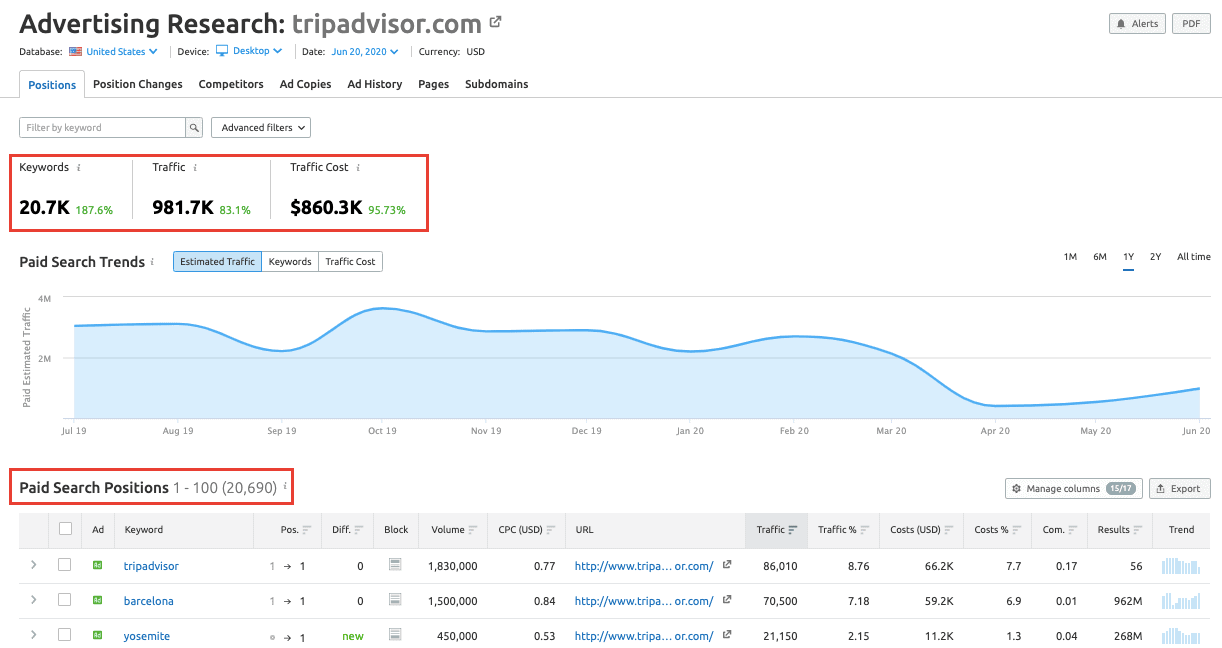
To view your competitors' PPC ad copies, visit the "Ad Copies" tab.
If your competitor invests a lot in advertising, then you may find ad copies in this report too imposing. Make sure you use the advanced filters to get the most relevant information for your PPC campaigns.
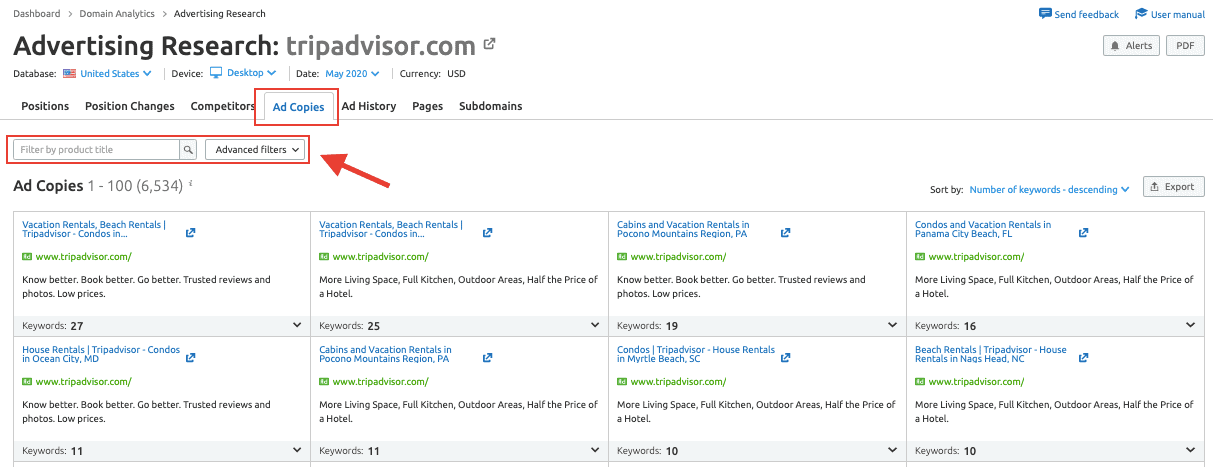
In addition to the aforementioned SEO and PPC tools, Semrush also has specific competitor analysis tools for content marketing and social media marketing.
The Brand Monitoring tool is especially useful for tracking online mentions of your brand, your competitors' brands, or any word or phrase that you wish to monitor.
To set up brand monitoring on Semrush, go to:
Competitive Research > Content and PR > Brand Monitoring > Project > Set up
You can include up to three competitor brands here and up to five keyword terms. Select the country and hit the "Start Tracking" button.
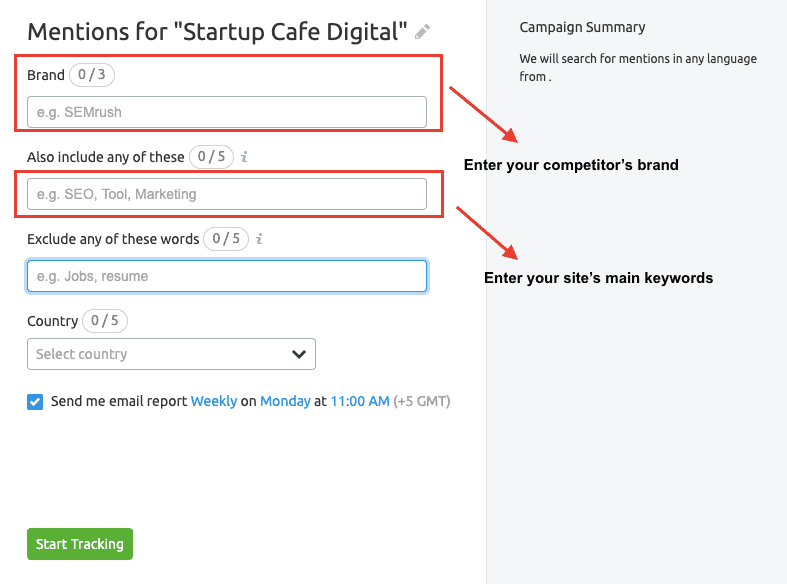
You'll now be able to track the online brand mentions of your competitors and the main keywords in your niche.
And finally, you have the Social Media Tracker, which lets you track the social media pages of your competitors and monitor their growth and engagement levels.
To set up social media tracking, go to:
Competitive Research > Social Media > Project > Set up > Social Media Tracker > Add competitor
![]()
On the next page, enter your competitor's brand name or domain in the search box and hit "Find Profiles." Semrush will automatically find your competitor's social media pages for you.
If you've enabled social media posting on Semrush, your social media pages will be automatically included in the Social Media Tracker. If you haven't enabled it, you can type your domain in the search box and click "Set as your company" next to your brand name.
![]()
You can add up to 20 competitor brands and track performance of up to 100 social media pages.
Once you've added your competitors' social media pages, hit the "Start tracking companies" button to get an overview report of your competitions' social media analytics, including social audience, posts, engagement, and top content.
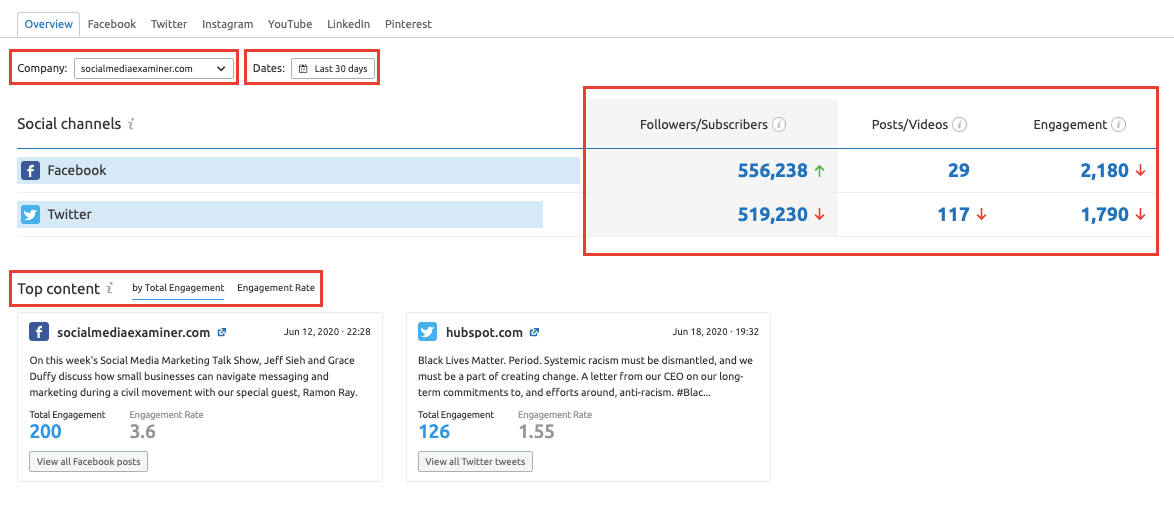
Scroll down to see the comparison of your social media performance against your competitors.

In addition to tracking audience growth, activity, and engagement, Semrush's Social Media Tracker is an invaluable tool to identify content trends and the different types of content that resonate the most with your target audience.
Get 1-month free trial to Semrush PRO (includes access to competitive research toolkit)
SpyFu: Competitor Analysis Tools
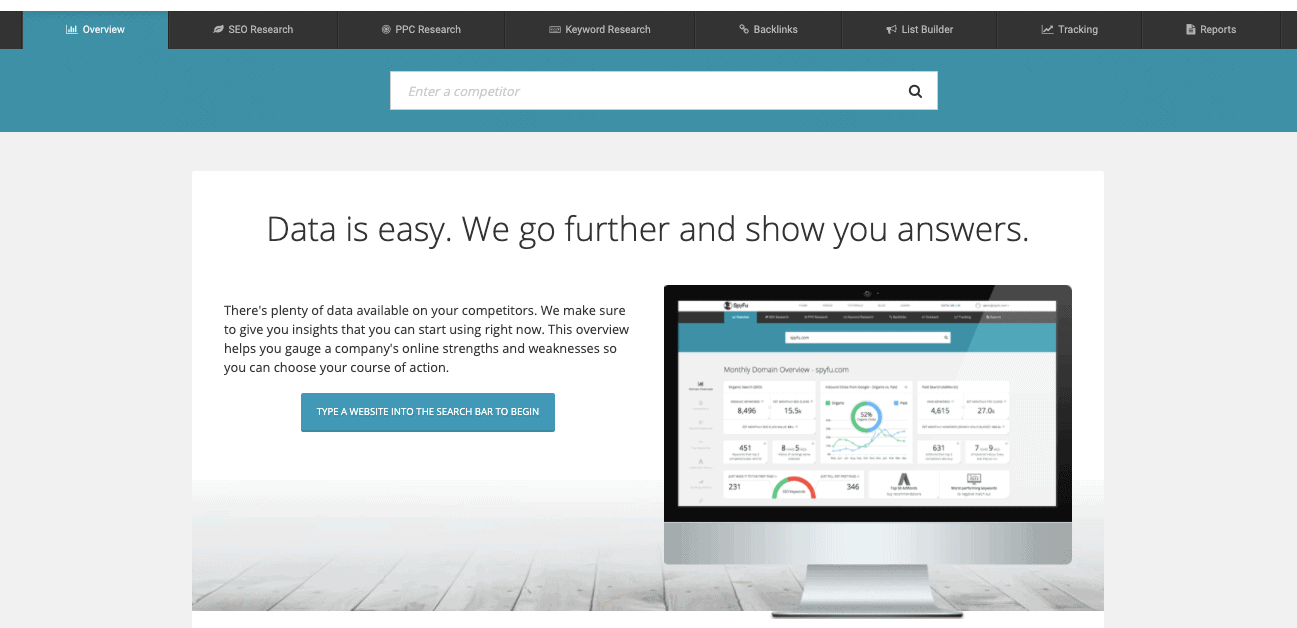
To get started with competitor analysis on SpyFu, enter your competitor's domain in the search box and hit the search icon.
You'll get a quick summary of the domain's top organic keywords, estimated monthly SEO clicks, top paid keywords, estimated monthly PPC clicks, backlinks, top pages, and so on.
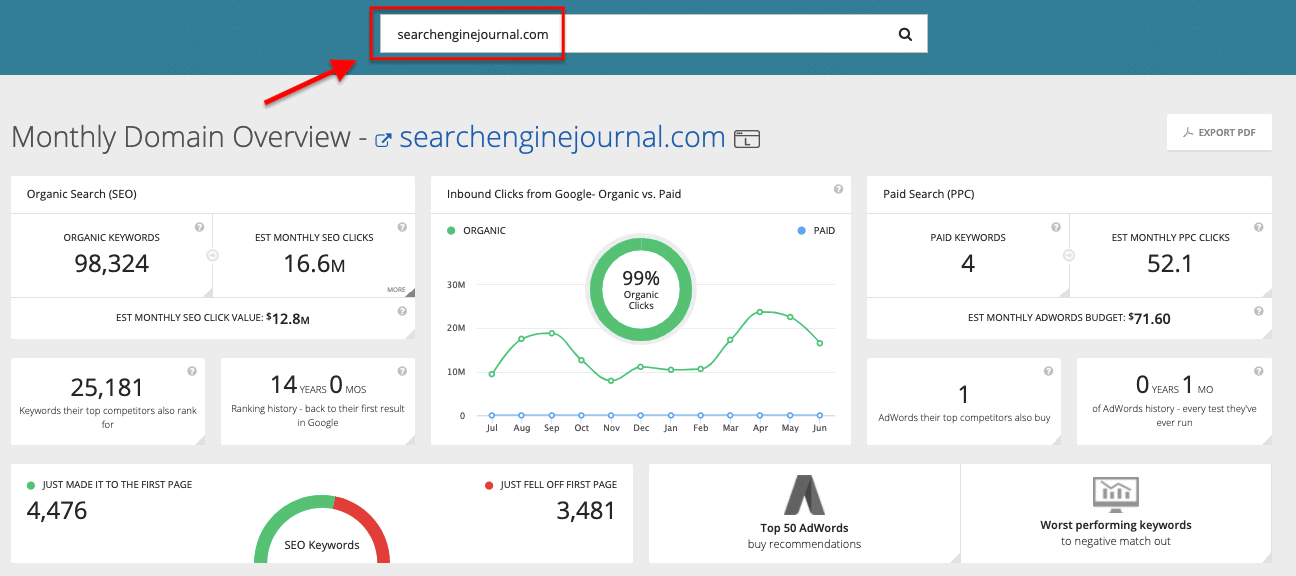
If you'd like SpyFu to identify your competitors, enter your domain and navigate to the "Competition" section of the report to view your organic and paid competitors.

Click on any of your organic competitors' domains to generate an SEO overview report of that domain, containing data on that site's organic keywords, estimated monthly SEO clicks, page 1 keywords, inbound links, and so on.
On the left side of the overview report, you'll find links to different sections within the report. Pay special attention to the "Top Pages" section as these are your competitor's top-ranking pages in organic search.
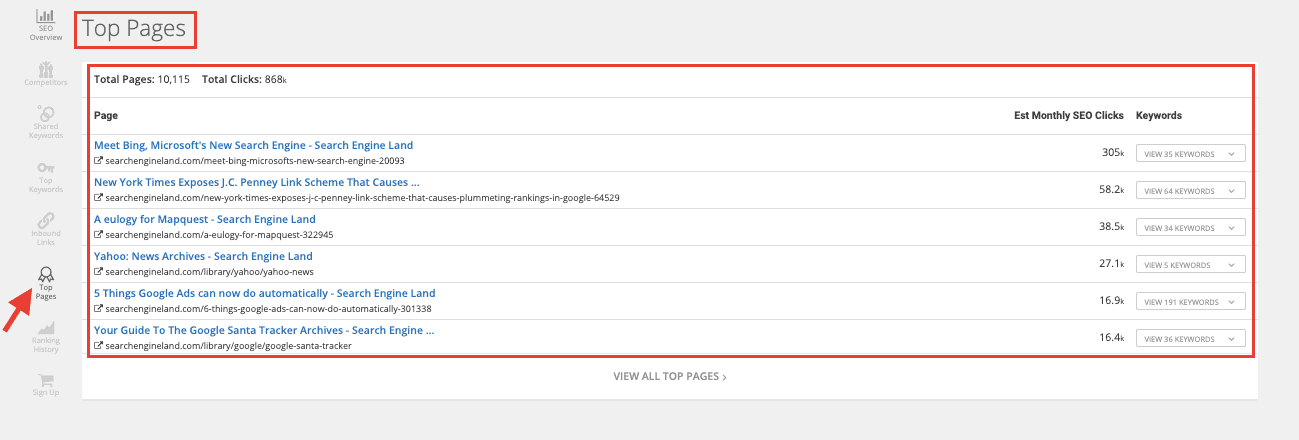
You can reverse-engineer these pages to find keyword ideas with traffic potential.
Similarly, you can click on any of your paid competitors' sites to get a PPC overview report of that domain's paid keywords, estimated monthly PPC clicks, monthly PPC budget, and other PPC metrics.
Navigate to the "AdWords Advisor" section of the report to view "Top AdWords Buy Recommendations" for your competitor's domain.
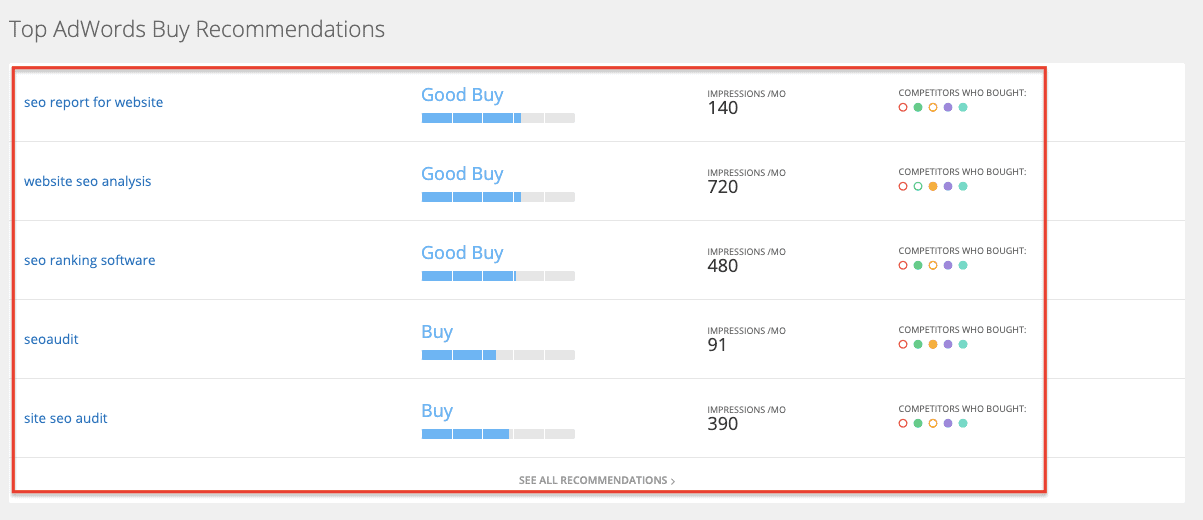
Click on "See all recommendations" at the bottom of the report or simply visit the "AdWords Advisor" tab to get a complete list of keyword recommendations. Use these recommendations to get the most out of your PPC campaigns.
Visit the "AdWords History" section of the report to browse your competitor's complete Google Ads campaign history, including their most trusted keywords, estimated clicks/month for those keywords, and their cost/click.
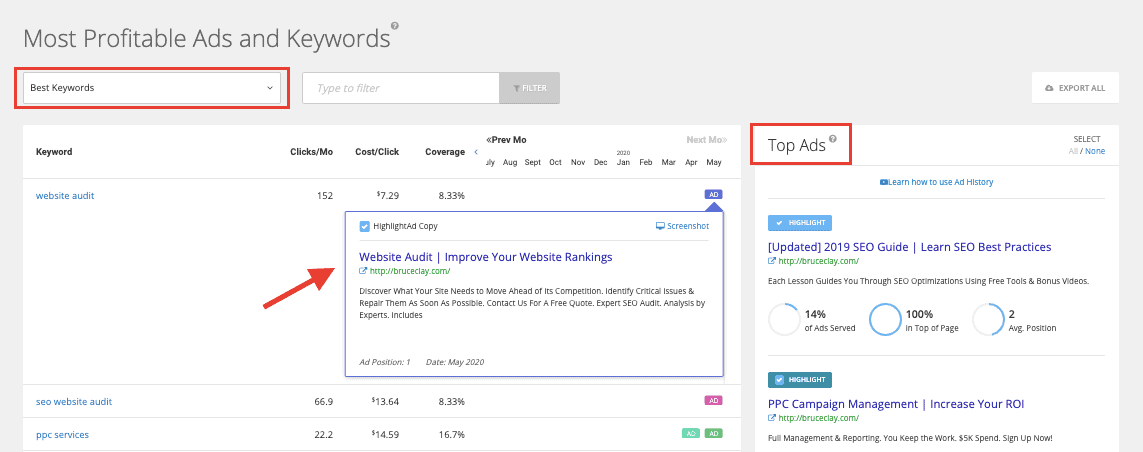
Beside each ad copy, you'll find keywords that trigger the specific ad.
Super helpful data if you're planning on replicating your competitors' ad strategies.
Sign up for SpyFu's free plan
Which Tool is Better for Competitor Analysis?
SpyFu is undeniably a great competitor analysis tool. But Semrush is better.
For starters, SpyFu lacks brand monitoring and social media tracking features which are vital components of competitor research. Your competitive analysis would have a blind spot if you didn't analyze your competitors' social media presence and didn't monitor their online brand mentions.
Besides that, I also found the competitor research reports in Semrush to be much more accurate and helpful than SpyFu.
Bottom line: SpyFu's competitive data pales in comparison to the sheer volume and depth of competitive data that you can unveil on Semrush.
Winner: Semrush
Keyword Research: SpyFu vs Semrush
Despite countless Google algorithm updates over the years, the importance of keyword research has remained constant. While outdated keyword research practices get penalized by Google, a more nuanced approach to keyword research is often rewarded with higher Google rankings.
As a result, keyword research is at the core of any SEO or PPC campaign. It helps you get a deeper understanding of your target audience and what they are searching for online.
Both Semrush and SpyFu uncover a ton of keyword data to help you in your quest to craft the kind of content that satisfies both users and search engines.
Read on to find out which of these tools is more effective in terms of keyword research.
Semrush: Keyword Research
Semrush is predominantly known for its keyword research capabilities.
Let's quickly examine some of its main keyword research features.
To get started with keyword research on Semrush, just type your target keyword(s) in the search box.
This will open up the Keyword Overview report, which will provide a quick summary of all major keyword metrics, including monthly search volume, keyword difficulty, CPC, and competition, along with relevant keyword variations and related keywords.
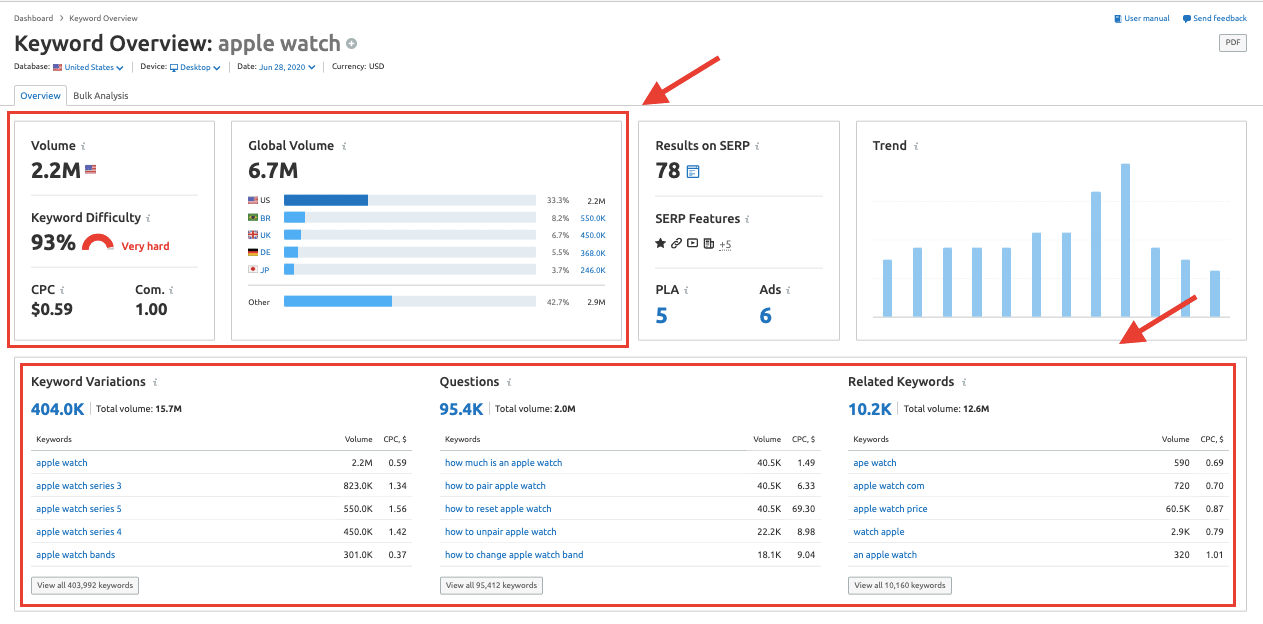
Note: You can change the geo database in your Keyword Overview report and see results and keyword variations for your target keywords in your location.
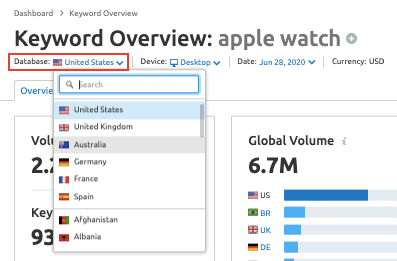
For in-depth keyword analysis and to find semantically-related long-tail keyword ideas in your niche, you need to try the Keyword Magic Tool.
To use the Keyword Magic tool, head over to:
SEO Toolkit > Keyword Research > Keyword Magic Tool
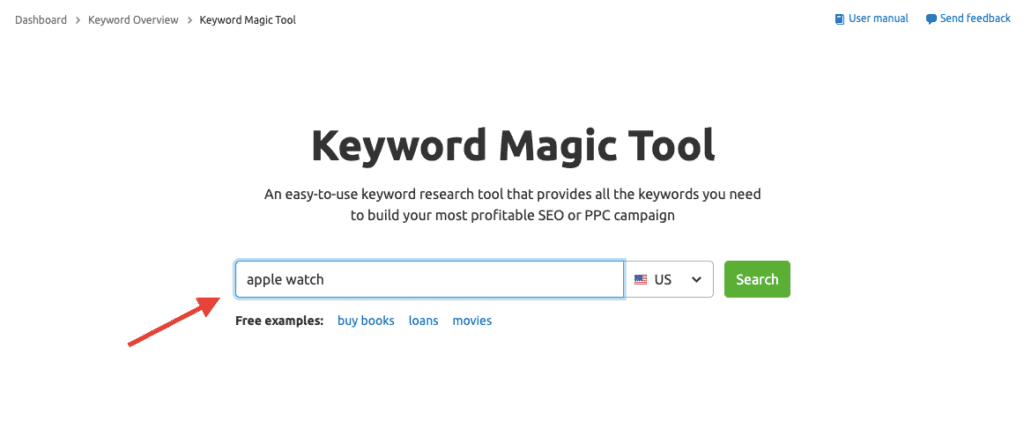
Enter your seed keywords in the search bar and hit the "Search" button. From your seed keywords, the tool will generate a list of keyword suggestions.
You can then sort the keywords by using keyword groups located on the left side of the table. You can either sort the groups by volume or by the number of keywords. You can even exclude a group of keywords by clicking on the eye icon next to the group.
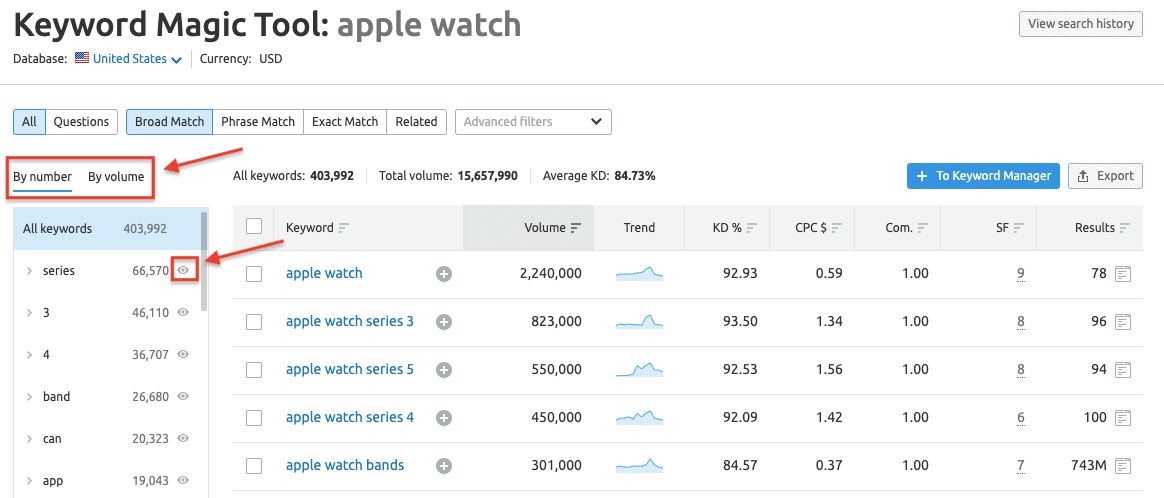
You can also use the match modifiers on top of the table to narrow down the list of keywords.

Also pay attention to the "Questions" filter to generate a list of question-based keywords that contain your seed keywords.

Once you've identified all the keywords you'd like to use in your SEO or PPC campaigns, save your findings by adding the keywords to Keyword Manager.
In addition to saving your work, the Keyword Manager will gather real-time metrics for your target keywords, so that you have fresh insights when you revisit the tool.
Besides traditional keyword research tools, you can also use the Topic Research tool in Semrush's Content Marketing toolkit. With the Topic Research tool, you can generate relevant topics, subtopics, questions, and headlines to include in your content.
To use this tool, navigate to:
Content Marketing Toolkit > Topic Research
Type in your target keywords, select your location, and hit "Get Content Ideas."

You'll then be presented with a list of subtopics for your target keywords.
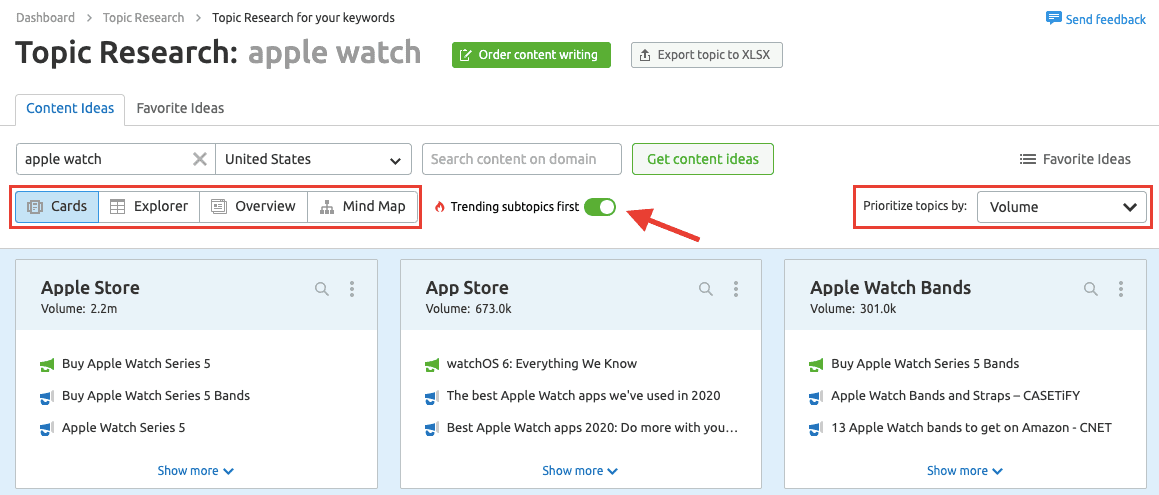
You can switch the view from Cards to Explorer (tables), Overview (condensed version), or MindMap (visual presentation). I prefer the Overview report as it lists down the top 10 headlines by backlinks and top 10 interesting questions surrounding your target keywords.
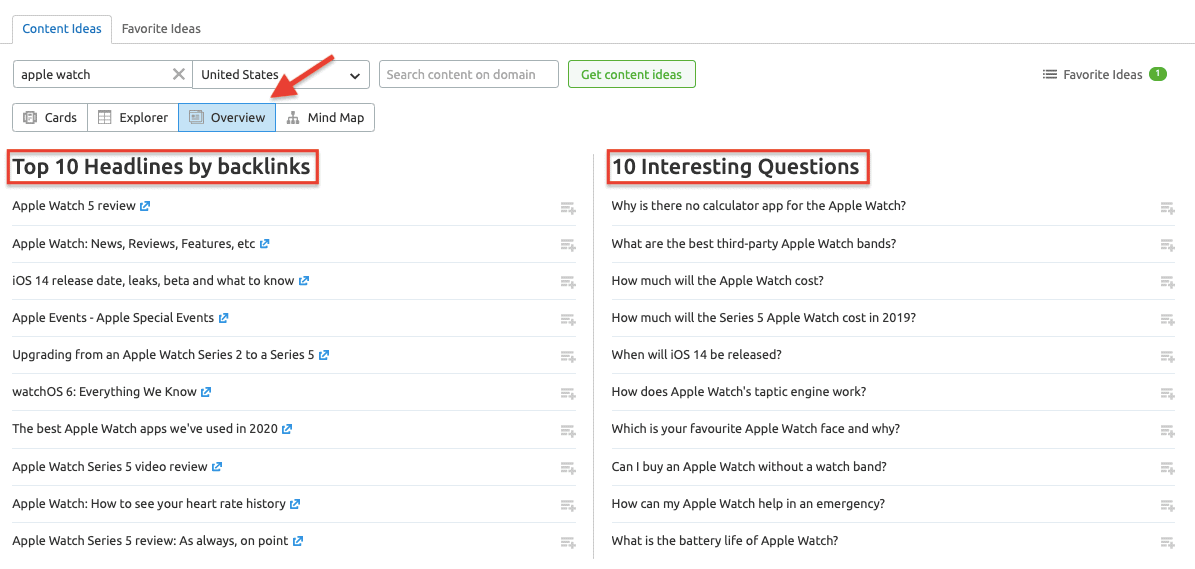
Add any of these headlines and questions to your list of "Favorite Ideas" and use them to create new blog posts or optimize existing posts.
Get 1-month free trial to Semrush PRO (includes access to the Keyword Magic Tool)
SpyFu: Keyword Research
SpyFu's strength lies in competitor-based keyword research.
That's not to say SpyFu doesn't ...
Comments
Post a Comment